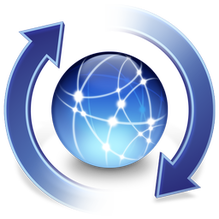|
You know the grinding noise you hear - not in your knees, but on your computer? That’s an indication it’s time to
defragment. It means you have a lot of fractured files that your computer has to scan and read to obtain the necessary information. Because of the extra work, your computer isn’t functioning at its optimum. After performing a balancing act over piles of papers on the floor just to open the window, I knew it was time to defrag my office. They were important papers and unfinished projects that I didn’t want to take from my line of sight, but the time had come. After about five hours of cleaning and filing, it was over. No help from Norton. Back to the grinding noise – this ended up being more than just office organization. I noticed something as I went through the files and folders, which spanned over several years’ worth of ideas. I noticed my attention had become fractured with these projects; I had been taking my eye off the target of my goal. As I reread some of the papers, there was a grinding chatter in head. Why did I waste time on this? Why wasn’t there a response to that? It seemed I had been taking myself further from my goal - leading myself off track. Why? Responsibility has been a cover I’ll throw on things I don’t readily understand. It’s a good defense. And especially with the current world situations and economic instability, it works. "I'm doing this in case something happens, at least I'm being responsible." As I dug a little deeper, I could sense fragments of fear, like shattered glass in many directions. In piecemeal fashion, I picked up the papers, removed the shards, and filed them away. Now I can function at my optimum. My goal, my vision is clearly in sight. That’s my responsibility. The grinding noise is definitely an indicator, whether it’s in your knees, computer, your head or heart. Take the time to defrag. My neighbor moved this week and it caused me to think of the boxes I have stored away – all that I’ve archived.
Boxes in the attic are one thing; memories, expectations, and dreams are something else. My first discovery regarding software and archiving was that once I archive data, I never access it. My second discovery was that I didn’t even know where it was stored. This intrigued me. So I examined the archive files on my computer as a way to begin exploring the topic. As an analogy, it poses an interesting question. What ideas, emotions, and memories am I archiving, and do I even know where to find them? Are the files so compressed that I wouldn’t recognize them, or their value? When I talk to families about their vacations and work/life issues, I will ask them to describe their most memorable vacations. The answers are often about a location they have visited. I’ll pose the question again emphasizing the word memorable. In most cases a different thought process ensues and the stories take on a life of their own – ranging from touching to disastrous, and are usually quite interesting. As I began my “official” archiving exploration, I sat down alone, closed my eyes (to focus), and asked myself a similar question. What are my most meaningful memories? Several images appeared center stage. I sensed there were others waiting in the wings. So mentally, I directed them in age groups (as a child, an adolescent, young adult, etc.) and encouraged 2 or 3 images in each group. I wanted to include different ages and aspects of my experience. This brought some interesting memories into focus. I mentally encouraged them to decompress - allowing full expansion and expression. Complete productions could have easily taken place, but I was eager to explore further. I changed the assignment from memorable to challenging. What are my most challenging memories? The most intense experience took center stage, not the most recent. This happened most of the time. I didn’t have to try to think of something. Images, scenes, and storylines simply appeared, as if they were waiting for an invitation to perform. I continued. The next assignments were to identify the most self-defining memories, and then the most fulfilling. My experience was fascinating and fulfilling in itself. I found myself moving deeper into the experiences. I began layering the exercises to include the initial cast of images and encouraging another level. What’s beneath this, and this – like rummaging through an enormous cluttered closet. I moved from using the word memory to the word experience. Memory implies the past and some of the images that emerged were dreams and expectations. Interestingly, these had been compressed and filed along with actual experiences. I realized that I hold them as close to my heart as actual events. As a family, we share the dreams and possibilities; this makes them real – maybe not actual, but real. Similar to virtual, I guess. Our family has an ever expanding menu for Isabel’s Café that we’re always testing. Somewhere Isabel’s Café exists. Throughout the week, I continued to explore archiving. I remembered an experience I had doing research at the Library of Congress. How extraordinary it was. With white cotton gloves covering my hands, I held in reverence the photographs of Ansel Adams, Aflfred Stieglitz, Dorthea Lange, and others. I hadn’t thought about this in a long time. But I remember sensing (or attempting to sense) the full expression and experience that each image portrayed. This was a significant recognition for me, then and now. As I continue the exploration of archives, I will examine my images, ideas, and ideals with equal respect and admiration. Join me. Let me know about your experience. I’ve found the archives easily accessible. You just have to take the time. Updates aren’t automatic – for computer software maybe, but not for people. When was the last time you went to sleep and woke up with a revised filing system for beliefs (not as neat and tidy as you might think), renovated resources for information and new ideas, or extra security to safeguard your identity (not your social security number – your actual sense of self)? It doesn’t happen. Usually an event transpires that causes us to realize things are out of sync, or we’re chatting with someone and stumble over an assumption that wasn’t altogether accurate. This is often how new, or corrected information and safeguards are received.
Take the idea of a revised filing system for beliefs. How convenient it would be to have something like a Google labeling system that places an item (or belief) in more than one folder. Then there are the beliefs that can go undetected. They can be commingled with what might be considered a fact. I refer to these as blind beliefs. For example, someone might think that as people grow older, they grow unhealthy. This isn’t a fact; it’s a belief. I hear this often with when I’m talking with people about vacations. “Oh, we won’t be vacationing when we’re in our 70’s. There’s cancer in my family and we’ll be too old to enjoy travel.” Are such individuals programming their future from a belief? If an athlete believes in himself and envisions a victory to help achieve success, wouldn’t the same hold true for everyone? Checking what has been downloaded through the years is vital. Where did the belief originate anyway? Is it valid or productive? Should it be deleted? Think about situations where people find themselves out of sync. Every day people are surprised to learn they have high blood pressure, cancer, or might lose their job. Maybe someone has simply veered off the path of their dream, or maybe their dream has changed. Usually these types of situations don’t happen overnight. To be in front of a problem and to be assured of top performance, it is important to take time to self-assess, reset priorities, refresh, and reconnect. Because updates aren’t automatic, we need to take time to update ourselves. A Google search will not have the answers. I’ll explore ideas like these and many others, all dressed in tech attire in the SELF Search Blog. Join with me and share your unique perspectives. I wish there was an update that could filter all the junk that finds its way into my internal conversations; it would sure save some time. |
SELF SearchWe access the computer more readily than we do ourselves. LOG OFF Archives
March 2022
CategoriesSearch Engine: a program on the Internet that allows users to search for files and information.
|



 RSS Feed
RSS Feed